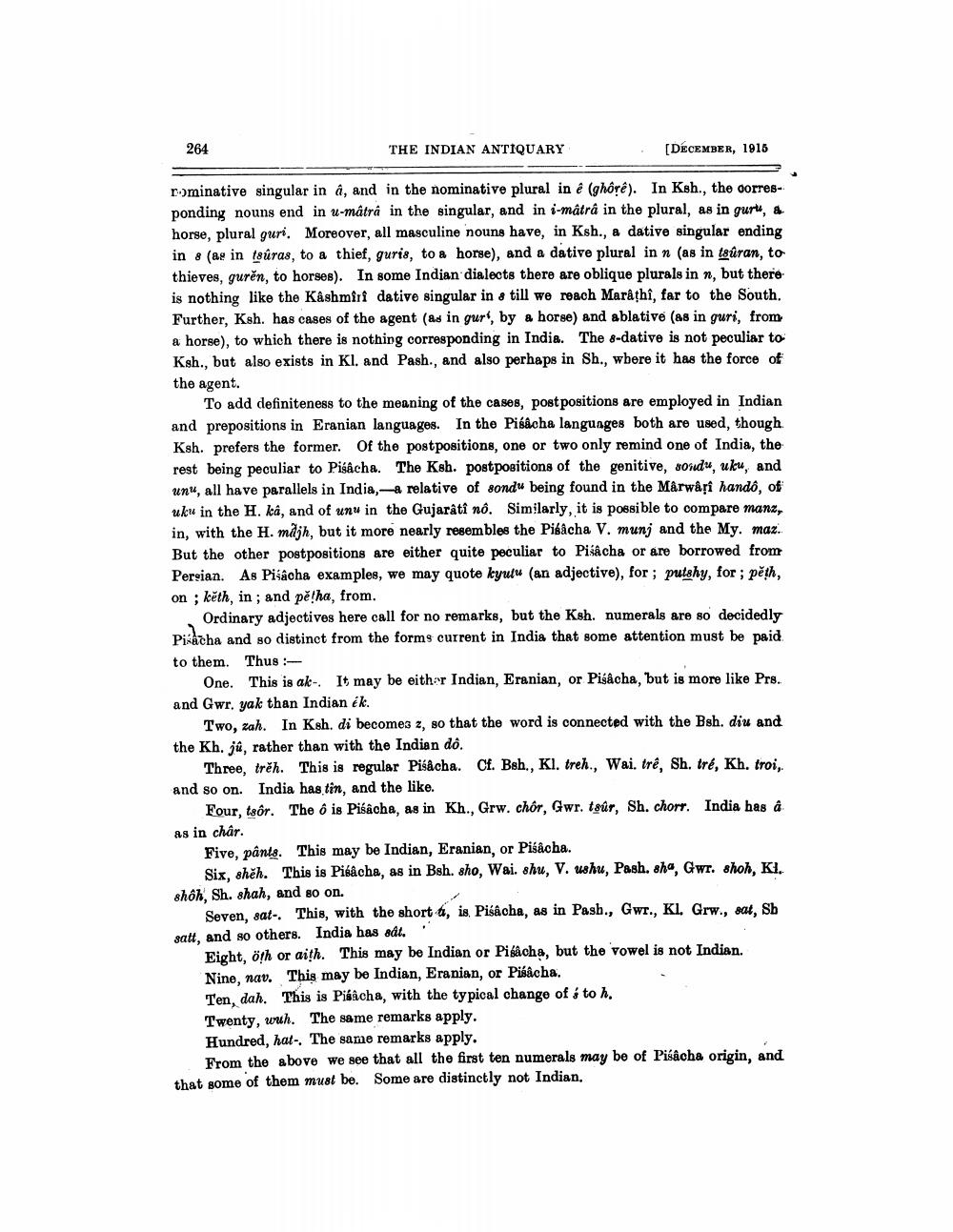________________
264
THE INDIAN ANTIQUARY
[DECEMBER, 1915
rominative singular in â, and in the nominative plural in ê (ghôrê). In Ksh., the corresponding nouns end in u-mâtrâ in the singular, and in i-mâtrâ in the plural, as in guru, a horse, plural guri. Moreover, all masculine nouns have, in Ksh., a dative singular ending in 8 (as in tsûras, to a thief, guris, to a horse), and a dative plural in n (as in tsûran, to thieves, guren, to horses). In some Indian dialects there are oblique plurals in n, but there is nothing like the Kashmiri dative singular in s till we reach Marathî, far to the South. Further, Ksh. has cases of the agent (as in gur, by a horse) and ablative (as in guri, from a horse), to which there is nothing corresponding in India. The 8-dative is not peculiar to Ksh., but also exists in Kl. and Pash., and also perhaps in Sh., where it has the force of the agent.
To add definiteness to the meaning of the cases, post positions are employed in Indian and prepositions in Eranian languages. In the Pisâcha languages both are used, though. Ksh. prefers the former. Of the postpositions, one or two only remind one of India, the rest being peculiar to Piśâcha. The Ksh. postpositions of the genitive, sondu, uku, and unu, all have parallels in India,-a relative of sondu being found in the Mârwârî hando, of uku in the H. kâ, and of unu in the Gujarâtî nô. Similarly, it is possible to compare manz, in, with the H. majh, but it more nearly resembles the Piśâcha V. munj and the My. maz.. But the other postpositions are either quite peculiar to Pisâcha or are borrowed from Persian. As Pisacha examples, we may quote kyutu (an adjective), for; putshy, for; peth, on; keth, in; and petha, from.
Ordinary adjectives here call for no remarks, but the Ksh. numerals are so decidedly Pisacha and so distinct from the forms current in India that some attention must be paid. to them. Thus :
One. This is ak-. It may be either Indian, Eranian, or Pisâcha, but is more like Prs. and Gwr. yak than Indian ék.
Two, zah. In Ksh. di becomes z, so that the word is connected with the Bsh. diu and the Kh. jû, rather than with the Indian do.
Three, trěh. This is regular Pisacha. Cf. Bsh., Kl. treh., Wai. trê, Sh. tré, Kh. troi,. and so on. India has tin, and the like.
Four, tsôr. The ô is Pisacha, as in Kh., Grw. chôr, Gwr. tsûr, Sh. chorr. India has â as in châr.
Five, pânts.
This may be Indian, Eranian, or Piśâcha.
Six, shěh. This is Pisâcha, as in Bsh. sho, Wai. shu, V. ushu, Pash. sha, Gwr. shoh, Ki.. shoh, Sh. shah, and so on.
Seven, sat-. This, with the short, is, Piśâcha, as in Pash., Gwr., Kl. Grw., sat, Sh satt, and so others. India has sát.
Eight, öth or aith. This may be Indian or Pisacha, but the vowel is not Indian.
Nine, nav. This may be Indian, Eranian, or Pisacha.
Ten, dah. This is Pisacha, with the typical change of to h.
Twenty, wuh. The same remarks apply.
Hundred, hat-. The same remarks apply.
From the above we see that all the first ten numerals may be of Pisâcha origin, and that some of them must be. Some are distinctly not Indian.




